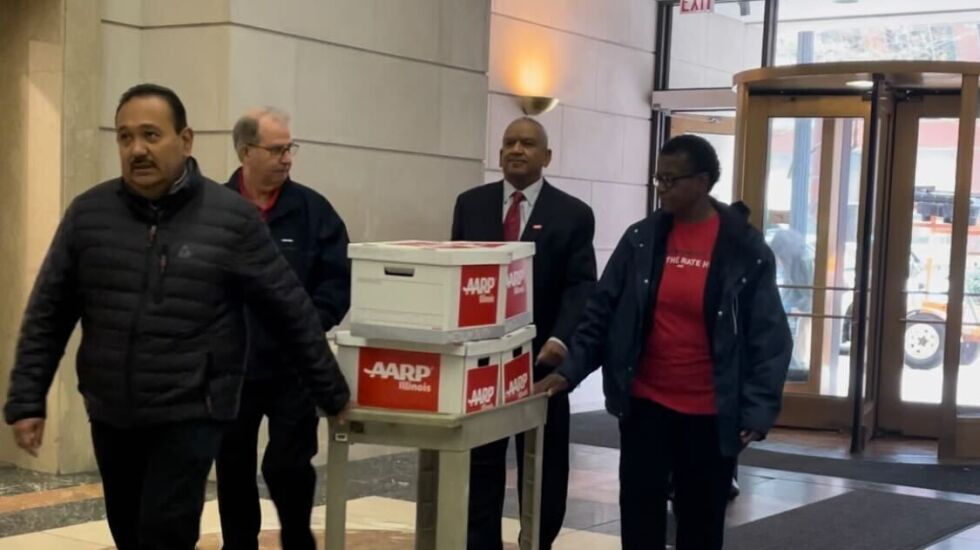
Consumer advocates in Chicago say a proposed Peoples Gas rate hike would hit low-income households especially hard and are pushing for a smaller increase.
The Illinois Commerce Commission is expected to vote on the proposed increase at its next public meeting 11:30 a.m. Thursday at 160 N. La Salle St. Meetings are livestreamed on the commission’s icc.illinois.gov website.
Peoples Gas petitioned the commission in January for a record increase of $402 million. If approved, that would translate to customers seeing an average monthly increase of $11.83 — or $141.96 a year — in their bills. Glennon Dolan, an administrative law judge for the commission, recommended that the hike total $350 million instead, which would mean customers would pay $10 more a month.
The Citizens Utility Board and other consumer advocacy groups say the rate hike could place Chicago residents in Black and Brown communities already struggling to pay their gas bills into further debt. They point to reports that Peoples Gas submits every month to the commission with the number of disconnection notices sent out.
In September, the utility sent disconnection notices to 57,120 customers — about 7% of Peoples Gas customers. That’s up from a year earlier, when 37,988 customers got disconnection notices — about 4.8% of the utility’s customers.
A Chicago Sun-Times investigation earlier this year detailed how utility companies including Peoples Gas use secret “risk rankings” to decide which customers who fall behind on their bills will have their service cut off soonest.

Illinois PIRG, a public interest advocacy group, did an analysis of the reports submitted by the utility and found about 26% of Peoples Gas customers in September were dinged with added fees for late payment.
In the 60619 ZIP code — which includes Chatham — there were 3,747 disconnection notices sent out in September, nearly 16% of customers in that area, according to the analysis. About 44% of customers in that ZIP code were hit with a late fee.
In the 60628 ZIP code — which includes Roseland — 3,173 disconnection notices were sent out, and about 38% of customers were assessed a late fee.
The 60621 ZIP code, which includes Englewood, had 46% of accounts that were more than 30 days past due, according to the analysis, and about half of all customers in that ZIP code were hit with late fees. About 20% of customers in that area were sent disconnection notices, according to the analysis.
More than 53% of customers in the 60649 ZIP code — which includes South Shore — were hit with a late fee, according to the analysis, and that area saw 2,439 disconnection notices in September.
“It’s an indicator of just the suffering and the stress and the potentially dangerous situations that vast swaths of our city — our neighbors — face,” said Sarah Moskowitz, executive director of the Citizens Utility Board. “Even if the utility doesn’t turn off the heat immediately, the family facing the disconnection is at great risk to fall further in debt. That debt can become much harder and harder to get out of.”
Advocacy groups have pushed for a lower rate hike, though any increase will likely result in consumers paying more for the utility.
“Even if advocates like me and the attorney general — those of us working to lower the rate hike — even if we are wildly successful, there’s still going to be a significant rate hike,” said Abe Scarr, director of Illinois PIRG. “People are going to be paying more.”
Hiola G. Alston, who lives in Auburn Gresham, worries how she’ll keep up with a higher gas bill. Retired and on a fixed income, Alston said she hasn’t fallen behind but has heard from neighbors who have had difficulty paying the utility.
In September, Peoples Gas sent 3,404 disconnection notices to customers in the 60620 ZIP code, which includes Alston’s neighborhood.
“I’m worried a little bit if I’m gonna be able to afford to have heat,” she said. “I’ve got to have gas heat to keep my pipes from bursting. What do I do? Do I take in a roomer? Do I take in somebody to help me with this so I’ll be able to afford to stay in my house?”
Ahead of the commission’s vote, Alston joined other AARP Illinois members who wheeled four boxes containing about 15,000 petitions to the commission’s downtown offices and urged the agency to “stop the outrageous rate hike.”
“They should really look at the whole picture as to what it is and why is Peoples Gas asking for another hike,” Alston said. “They’re not giving up anything. We’re the ones that’s paying to keep them in business.”

“They cannot afford their utility bills today — prior to the rate increase,” said Philippe Largent, state director for AARP Illinois. “On the heels of the first snowfall and freezing temperatures of the year, we’re worried for our friends and neighbors who have shared in these petitions that they have to make the impossible choice between heating their home or paying for groceries and prescriptions.”
During a Chicago City Council committee hearing, members grilled Peoples Gas president Torrence Hinton about the company’s profits and the management of the utility’s pipe-replacement program.
Hinton said customers struggling to pay their monthly bill are urged find out whether they are eligible for assistance through programs operated by the utility, state and federal government.
“We are certainly sensitive to the fact that a lot of Chicagoans are struggling to pay their bills,” Hinton said. “Many are struggling to pay all of their bills, let alone their utility bills, which is why we have not been before the Illinois Commerce Commission for a rate filing in almost nine years.”







